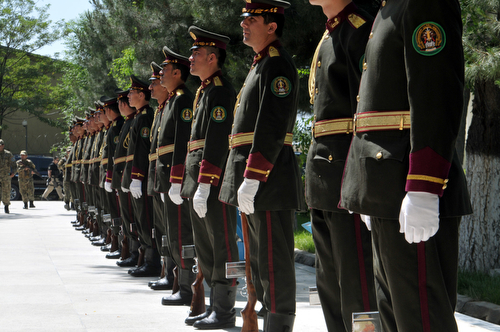Afghanistan: Die internationalen Truppen bleiben in der Fläche
Gut 900 deutsche Soldaten sind weiterhin in Afghanistan im Einsatz; das Interesse an dieser Mission insgesamt (nicht nur am deutschen Anteil) scheint allerdings nur noch recht gering. Dabei ist klar, dass die Resolute Support Mission der NATO am Hindukusch weitergeht und die eigentlich geplante Verringerung und Konzentration auf die Hauptstadt Kabul in weitere Ferne gerückt ist.
Das machte auch NATO-Generalsekretär Jens Stoltenberg nach dem Treffen der Verteidigungsminister der Allianz am (gestrigen) Mittwoch deutlich:
On Afghanistan, what we have decided is that we will continue our Resolute Support Mission. We will have what we call a flexible regional approach, meaning that we will continue of course to be in Kabul but also out in the different regions.
We are now working on the final decisions for our exact force numbers into 2017, so that’s something we will decide later on this year, but the thing is that we will continue in Afghanistan, also with a regional presence, we will continue to advise and train and assist Afghan National Forces because we are very much committed to continue to support Afghans. And I think it’s also important to underline that also during this meeting several nations announced that they will continue, they have forces, and they committed forces also to a presence in Afghanistan in 2017.
Der Begriff a flexible regional approach dürfte nichts anderes heißen als: Wir wollten zwar unsere Präsenz in der Fläche beenden, aber das geht zurzeit nicht.
Dazu passen auch ein paar andere Meldungen aus diesen Tagen; hier als Sammlung (umgekehrt chronologisch):
• AP: US Commander in Afghanistan Submits His 3-Month Take on War
The new U.S. commander in Afghanistan has submitted his first three-month assessment of the situation in the war-torn country and what it’s going to take to defeat the Taliban, a U.S. military official has told The Associated Press.
And though the content of the review by U.S. Army Gen. John W. Nicholson is secret, the U.S. strategy in Afghanistan received a major incentive this month when President Barack Obama decided to expand America’s involvement with more airstrikes against insurgents, giving the U.S. military wider latitude to support Afghan forces, both in the air and on the ground.
• Stars&Stripes: Air Force to increase airstrikes in Afghanistan
• TOLONews: Taliban Change Their War Tactics: Experts
• Reuters: U.S. may not make Afghanistan troop decision by Warsaw summit
• VOA: Taliban Belittles Plan for Broader US Military Role in Afghanistan
Nachtrag: Diese Geschichte gehört auch noch auf jeden Fall zur Beschreibung der Situation:
• AFP: Taliban use ‚honey trap‘ boys to kill Afghan police
The Taliban are using child sex slaves to mount crippling insider attacks on police in southern Afghanistan, exploiting the pervasive practice of „bacha bazi“ — paedophilic boy play — to infiltrate security ranks, multiple officials and survivors of such assaults told AFP.
The ancient custom is prevalent across Afghanistan, but nowhere does it seem as entrenched as in the province of Uruzgan, where „bacha bereesh“ — or boys without beards — widely become objects of lustful attraction for powerful police commanders.
The Taliban over nearly two years have used them to mount a wave of Trojan Horse attacks — at least six between January and April alone — that have killed hundreds of policemen, according to security and judicial officials in the province.
(Archivbild: Afghan National Army Honor Guard soldiers await the arrival of distinguished visitors at the seventh Oversight Coordination Body meeting, June 6,2016, in Kabul – Lt.j.g. Christopher Hanson, Resolute Support Headquarters)




Obama wird erst im Herbst entscheiden (Wahlkampf) ob er 2017 – wie angekündigt – weiter reduziert und die US sich aus der Fläche nach Kabul zurückziehen, oder ob es bei der gegenwärtigen Stärke und dem hub-concept bleibt.
Ich persönlich denke nicht das die Speichen einklappen und sich alles auf KBL konzentriert.
Ich persönlich würde einem weiteren Abschmelzen zustimmen, unsere Arbeit im Norden ist getan!
Effekte werden nicht mehr erzielt!!
@Fritz: Arbeit getan? Naja eher nach nicht geschaffter Arbeit wieder nach Hause und in Afghanistan alles auf Anfang wie zuvor. Mit einer handvoll Soldaten wird man auch nichts mehr erreichen, richtig. Arbeit liegen gelassen und nicht erledigt, aber das bestätigt meine Einschätzung von vor fast fünfzehn Jahren (ist das wirklich schon so lange her?), wie das Enden wird in Afghanistan.
Wirkung ist eher vernachlässigbar und wie man mit der Eroberung von Kundus letztens gesehen hat ist in AFG nix erledigt. „Mission accomplished“ fällt Mir da nur ein…